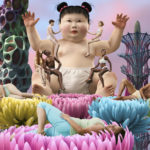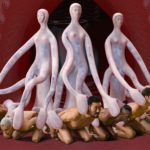The Russian multidisciplinary artist collective AES+F, together with Italian director Fabio Cherstich, have conceptualized a bold new reimagining of Puccini’s Turandot.
T. PROJECT is a caleidoscopic journey offering different experiences to the public of one of the most celebreated operatic Italian works.
The first appointment is the inauguration of the season at Teatro Massimo di Palermo. The Opera is a coproduction of Teatro Massimo, Palermo and Lakhta Center, Saint Petersburg, with Badisches Staatstheater, Karlsruhe, and Teatro Comunale, Bologna, with the support of Alcantara S.p.A., Italian Cultural Institute in Moscow, and hardware support from Advanced Micro Devices, Inc.
Project T will be also developed as a video art installation for galleries and museums, as well as large-scale evening event with live music in collaboration with contemporary composers and musicians.
With Cherstich, AES+F have reimagined the setting of Turandot as a globalized future, refusing all stereotypical ethnic characterizations and hinting at a hybrid and diverse future society.
This new and thoroughly revolutionary interpretation of Turandot is set in the year 2070 in Beijing, a futuristic metropolis with biomorphic architecture within an artificial landscape. Heading a renewed, gigantic, and multiethnic Chinese empire, Princess Turandot has imposed a radical techno-matriarchy upon society. The masses are a vulnerable and confused society, trained by those in power to tolerate violence; their public displays of adoration for the princess border on idolatry and mass hallucination. In the story’s time setting, our present time is the past. Turandot’s trauma hence stems from our current time.
Originally written in Persia with a Russian setting, later rewritten by Gozzi, an Italian, to be set in China, Turandot is an early”globalized” fable, in which ethnicities and nationalities have relatively little bearing to the depiction of a fantastic, abstractly faraway world. When Turandot premiered in 1926, the atom bomb didn’t exist. China was several weeks of travel away from Europe, and Italian women had no right to vote. It was a different world: and restaging that opera now means crossing a gap in time. Music, words, images and movements as Puccini and the librettists imagined them will often have a different meaning to a contemporary audience. This gap is even wider since the themes and setting of Turandot are marked by an Orientalism that strikes us today as deeply problematic – a subject of political and ethical debate worldwide.








